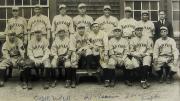With this talk of thrills we are not of course referring to the 2015 Red Sox. We are harking back to the happier days of the 1927 Crimson baseball team— “one of the best of all time,” according to The Second H Book of Harvard Athletics.
Isadore Zarakov ’27 was the captain, Fred Mitchell the coach. Izzy Zarakov never got his degree (he failed his general examinations), but before he didn’t, he left his mark on the Harvard record books. He played football, hockey, and baseball, lettered eight times, and in 1968 was inducted into the Harvard Varsity Club Hall of Fame.
“It seemed fitting,” the H Book sums up, “that the most thrilling moment of the exciting 1927 season was saved for the very last inning of the last game. Harvard was trailing, 5-4, with two outs and [William] Lord on first. Captain Isadore Zarakov ’27 picked out the heaviest bat in the rack, strode to the plate, and walloped a home run to beat Yale, 6-5. The ball, it is said, rolled to the huge wooden back-stop on the freshman diamond, and to this day both the back-stop and ‘Zarakov’s home run that beat Yale’ have been targets for Crimson clouters to reach.”
Interrogation: James N. Connor ’60, a musician who lives in Boaz, Alabama, writes in his fifty-fifth anniversary class report: “After football season of my junior year at Gadsden (Alabama) High School, my homeroom was visited by three men in neat Sunday suits with rep ties and perfectly ironed sparkling white collars that had absolutely none of those microscopic wrinkles ironed into them like my white cotton collars always had when Mother made me iron my own Sunday shirts. And, yes, each pair of shoes were shined so bright that I thought I could comb my flattop in their reflection. They asked Mrs. McWilliams for permission to take me to the principal’s office. I knew then that these three guys were special police investigators who had come to take me to juvenile hall because, when I was thirteen, I had stolen a roll of tools from Sears and Roebuck Co., which I’d been using to keep my Cushman Motor Scooter running so I could deliver my morning paper route.
“Principal Dobbs told me that Mother was also on her way to his office,” Connor continues. “I then knew my goose was cooked. I had prayed for forgiveness of my sin, but, apparently, to no avail. We walked through the main school office into a smaller private office and they closed the door. The three men all sat down in a row on a World War II surplus olive drab vinyl couch. I glanced to see if they were armed. The principal offered me a brown metal folding chair facing them. I then knew that the interrogation had begun. All four were quiet for a minute or so, looking at me; Mother had not yet arrived. Mr. Dobbs said, ‘Jim, these gentlemen would like to ask you a few questions.’
“The man in the middle,” Connor writes, “the one with the most gray hair, spoke first and, without a smile, he said, ‘James, have you ever considered going to Harvard College?’”







